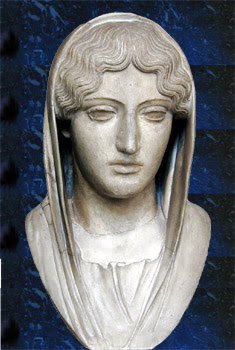Ressenya
She acquired her knowledge in Miletus -in the Ionian cities, boys and girls lived together in the public school and shared learning on an equal footing-. Because of her extreme expertise in the art of rhetoric and her ability to surround herself with the most illustrious and renowned intellectuals of her time and to contribute actively to the flourishing of cultural life in Athens, she won the admiration and respect of philosophers, artists and illustrious democrats. Because of her status as a foreigner, her supposed influence over Pericles, and her life as a free and independent woman, she was instead attacked, ridiculed and vilified by conservatives and comedians.
Justificacions
- Teacher of rhetoric and philosopher.
- Logographer.
- She had great influence on the cultural and political life of the Athens of Pericles.
Biografia
Daughter of Axiochus, she was born in the cultured and liberal Ionian city of Miletus, one of the Greek cities of Asia Minor, now in Turkey. Her name means "the beautiful welcome" and she belonged to a wealthy family, which allowed her to receive an excellent education.
She moved to Athens around 450 BC, where, as a teacher of rhetoric and logographer, she had great influence on the cultural and political life of the city. We only have reliable information about her life in the period between her union with Pericles, ca. 450-445 BC, and the death of Lysicles, her second husband, in 427 BC. This news reaches us indirectly through the writings of Plato, Aristophanes, Xenophon, Plutarch and other authors, all male.
In the social circles of Athens, she was noted for her rhetoric and brilliant conversation. Her house became an intellectual center and attracted the most prominent writers and thinkers, including the philosopher Socrates, who, according to Plato, considered her his teacher of rhetoric -in the Menexenon, Socrates states that his teacher combined improvisation with the reuse of speeches already delivered and that she composed the speeches of Pericles, especially the funeral prayer reproduced by Thucydides in his History the Peloponnesian War-.
Probably, it was her way of life that earned her her consideration as a 'hetaira' (courtesan) and head of a brothel, probably a hoax spread by Pericles' enemies and fed by comic authors, especially Aristophanes: as a foreigner, Aspasia was not subject to the legal restrictions that traditionally confined married women to the realm of the gynaecum, and could therefore participate in the public life of the city. On the other hand, Pericles treated her as an equal and did not hide his displays of affection. All this scandalized the "respectable" men, who made Pericles the object of their criticism, attacking him through Aspasia. Also, her enemies presupposed a strong influence of Aspasia in the affairs of state: she dealt directly with the circle of friends of Pericles and with Socrates himself, who, through his influence came to advocate equality between men and women. According to Plutarch, it was believed that Aspasia had been responsible for the Samian War and that Pericles had made the decision to attack influenced or advised by her.
Before the outbreak of the Peloponnesian War (431 BC - 404 BC), Pericles, some of his closest associates and Aspasia faced a series of personal and judicial attacks initiated by these political enemies. Aspasia was accused of impiety and of corrupting the women of Athens to satisfy the perversions of Pericles. The accuser was the comic poet Hermippus. However, all these accusations were probably nothing more than baseless claims, since she was declared innocent and Hermippus was not punished for a crime of infamy.
Obres
- As a logographer, she was supposedly the author of Pericles' speeches, especially the Funeral Speech.
Bibliografia
-González Suarez, Amalia (1997), Aspasia, Madrid: Ediciones del Orto
-Mayor Ferrandis, Mª Teresa (2011), «Aspasia de Mileto», Revista de Claseshistoria, art. No 184, (retrieved on 31/10/2021) <Dialnet-AspasiaDeMileto-5168269.pdf >
-Platón, Menexeno, in Obras completas (1871), t. 2. Madrid: edición de Patricio de Azcárate, (retrieved on 31/10/2021) <https://www.filosofia.org/cla/pla/img/azf02151.pdf>
-Solana Dueso, José (1994), Aspasia de Mileto. Testimonios y discursos. Barcelona: Anthropos, (retrieved on 31/10/2021) < Testimonios y discursos - Aspasia, Aspasia de Mileto - Google Libros>
Enfocament Didàctic
-Classical culture: Block Classical roots of today's world. History and socio-political evolution; Block Classical roots of today's world. Everyday life;
Block Continuity of cultural heritage. Literature (Rhetoric and Oratory), art and science.
-Greek Baccalaureate: Block Ancient Greece; Block Literary Education.
-History 1st ESO: Societies and territories block, referring to Greece.
Documents
